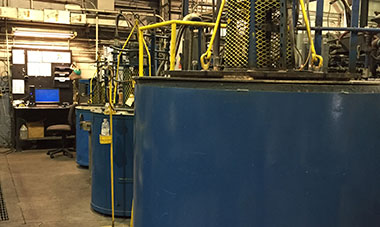Nitriding and Metallurgical Behavior
Gas nitriding is a form of steel heat treatment in which one uses heat to diffuse nitrogen-rich gas onto the surface of the metal with the intention of hardening it. The nitride hardening process integrates into the bulk material, allowing the portion of metal below the surface layer to remain soft.
Ammonia is the most commonly used gas and it separates into nitrogen and hydrogen when it comes into contact with the metal. Only the nitrogen diffuses onto the surface to form the nitride layer. Quenching methods (such as oil quenching) is not required, and the metal’s core properties are not affected.
Gas vs. Liquid Nitriding

The heat requirements for liquid are lower than for the gas technique, and the hardened compound on the surface of the component is thicker.
The operation is simple and the processing time is faster than the gas-based method, but the salts left over are highly toxic. The gas-based process has easier disposal methods of the nitriding agent.
Nitriding vs. Carburizing
Carburizing is similar to gas nitriding in that it is a heat-based process that produces a wear resistant, anti-gall surface. Instead of nitrogen, the base is carbon. Quenching and tempering may be necessary to minimize distortion as there are microstructure changes that occur during the hardening process. The case formed during the nitride hardening process is not as thick as carburizing.
Advantages of Gas Nitriding
- Low-cost compared with other case applications. The process runs with minimum required supervision, post-process components are dimensionally stable, and there is very little if any treatment necessary in post heat treat operations.
- Zero to minimal distortion experienced on parts, which enables precise dimensional control
- High volume capability. Furnace size is the primary limiting factor.
- Wear and corrosion resistant.
• Increased fatigue strength - Gas flow rate can be precisely controlled, and parts can be masked, preventing hardening in some areas. This allows for post-application machining,
- Clean parts are produced, with none of the residues that accompany salt baths, carburizing and
- other processes.
Best Use Applications
The United States began developing nitriding processes in the early 1900’s, but there was little interest for industrial uses until after World War II. In applications that require improved fatigue strength and precision, such as in extrusion screws and precision gears, gas nitriding is most appropriate.
Highly-stressed machine components and low-alloy steels also benefit from the durability attained with this process. Low-carbon steel tools may corrode sooner than expected without this case application. Automotive parts such as crankshafts, valve parts and springs can maintain a level of malleability that prevents cracking under extreme conditions.
Due to its enhanced corrosion resistance and anti-galling properties, it is a primary process used in aircraft components, from pistons, rods, and spacers to shaft pins, nuts and bolts.
Nitride Hardening Process
The nitride hardening process is used on the main components of construction machinery because of the sliding properties it provides, preventing scuffs and dents. Refining the process by understanding the kinetics involved has resulted in achieving a thicker hardened layer and exploring a broader range of use applications.
Call Specialty Steel Treating Today
Specialty Steel Treating is proud to offer a wide array of steel heat treating services, including gas nitriding. We have over 60 years of experience servicing multiple industries. Contact us for a quote today.

